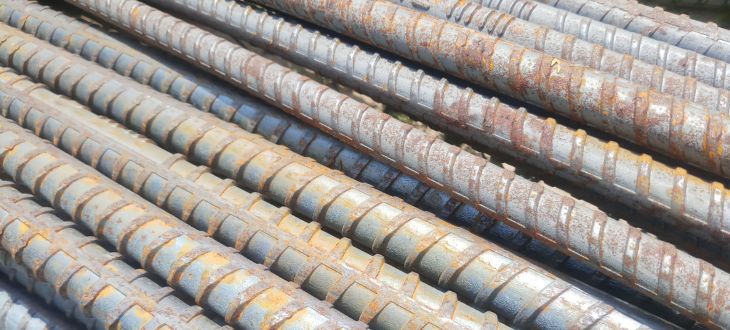Reinforcing materials play a critical role in ensuring the strength and durability of structures in construction and civil engineering. Fiber-reinforced polymer (FRP) rebar is an innovative material gaining traction. This blog post will explore FRP rebar, how it differs from traditional steel rebar, and answer frequently asked questions about its use and benefits.
What is FRP Rebar?
FRP rebar is a reinforcing bar made from Fiber Reinforced Polymer, a composite material of a polymer matrix reinforced with fibers. The fibers are typically made from glass (GFRP), carbon (CFRP), aramid, or basalt, while the polymer is usually epoxy, vinyl ester, or polyester thermosetting plastic. These materials are combined to create a lightweight, non-corrosive rebar with high tensile strength.
The Production Process
FRP rebar is manufactured through a process called pultrusion. In this process, the fibers are pulled through a resin mixture, thoroughly coated, and then passed through a die to form the shape of the rebar. This method aligns the fibers longitudinally, which maximizes their strength along the length of the bar.
How does FRP rebar differ from traditional steel rebar?
The primary differences between FRP rebar and traditional steel rebar lie in their material properties and the implications of those properties on construction and long-term maintenance.
Material Properties
- Weight: FRP rebar is significantly lighter than steel rebar, weighing about one-quarter as much. This makes it easier to transport and handle on construction sites.
- Tensile Strength: While FRP rebar has a higher tensile strength than steel, it is also more brittle and less ductile. This means that it can support a heavier load and is less likely to deform before breaking.
- Corrosion Resistance: Unlike steel, FRP rebar does not rust or corrode, which makes it ideal for use in structures exposed to corrosive environments like marine structures and roadways where de-icing salts are used.
Cost-Effectiveness and Longevity
Although FRP rebar is more expensive than traditional steel rebar, its durability and maintenance-free nature make it cost-effective in the long term. The lack of corrosion leads to longer structure life spans and reduced costs related to repairs and maintenance.
Applications of FRP Rebar
FRP rebar is particularly useful in applications where environmental factors threaten the structural integrity of concrete. Some typical applications include:
- Bridges and Docks: Areas with high exposure to moisture and salt.
- Medical Facilities: Magnetic interference can be an issue in environments with non-magnetic FRP rebars.
- Parking Structures and Water Treatment Plants:Structures that are susceptible to corrosion.
Frequently Asked Questions About FRP Rebar
Is FRP rebar as strong as steel rebar?
FRP rebar generally has a higher tensile strength than steel but lacks the same level of ductility. This means it can support more weight but will not bend as steel does under stress.
Can FRP rebar be used in all the same applications as steel rebar?
While FRP rebar is suitable for many applications, its use in high-temperature environments is limited due to the polymer’s sensitivity to heat.
How does the cost of FRP rebar compare to that of steel rebar?
Initially, FRP rebars were more expensive than steel rebars, but their longevity and reduced maintenance requirements have made them more cost-effective.
Is FRP rebar difficult to install?
Due to its lower weight and flexibility, FRP rebar requires different handling and installation techniques. However, these are generally easy to adapt to and do not significantly change the installation process.
The Pros and Cons of FRP Rebar
The Pros
- Corrosion Resistance: Ideal for harsh environments, reducing long-term maintenance and repair costs.
- Lightweight: Easier and less expensive to transport and handle.
- Non-Magnetic: Suitable for use in sensitive environments such as hospitals and computer labs.
The Cons
- Higher Initial Cost: More expensive upfront than traditional steel rebar.
- Brittleness: Less ductility means it can crack under extreme loads without warning.
- Thermal Sensitivity: Not suitable for high-temperature applications.
FRP rebar represents a significant advancement in construction materials, providing options for environments where traditional steel rebar might fail prematurely due to corrosion or other factors. While it may not replace steel rebar in all contexts, its specific advantages make it an excellent choice for certain projects, particularly those in corrosive environments or where weight and magnetic properties are concerns. As materials technology advances, the role of FRP rebar in construction is likely to expand, offering more opportunities and solutions for complex engineering challenges.
Visit Tampa Steel & Supply for Quality Metal and Metal Processing Services
Do you need help with metalworking and keeping your metal fresh? The experienced professionals at Tampa Steel & Supply are here to help. We provide the highest quality of services to our customers.
Request a Quote Online
Or Call Tampa Steel & Supply at (813) 241-2801

